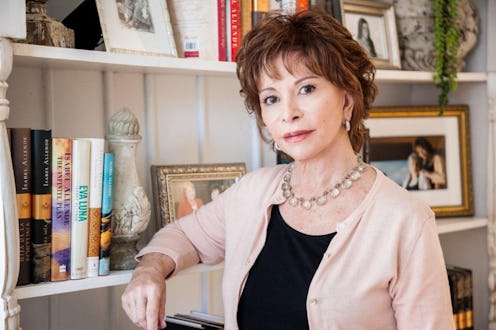Books
'The Japanese Lover' Is A Magical New Allende Book

I credit Isabel Allende — not the great Gabriel García Márquez or Jorge Luis Borges — for introducing me to the rich and wonderful world of magical realism. As a high school kid, House of the Spirits, with its green-haired beauties and fiery love affairs, knocked my socks off. Allende’s newest novel, The Japanese Lover (Atria), is not quite as epic or immersive as some of her earlier works, but it still delivers all the ingredients Allende fans expect: the multi-generational family drama, passion, heartbreak, secrets, and just a whiff of magic.
The Japanese Lover shifts between present day in a convalescent home in San Francisco, and the past, starting right before World War II. With the war looming, Alma Belasco’s parents ship her from Poland to San Francisco, the home of her aunt and uncle. At their sprawling Sea Cliff mansion, Alma forms what wind up being life-long bonds with Nathaniel, her older cousin, and Ichimei Fukuda, the gardener’s son.
The young friends are forced to part after the Japanese attack on Pearl Harbor, when Ichimei and the rest of his family are interned in a camp in the middle of the Utah desert along with hundreds of other Japanese-Americans. Alma and Ichimei exchange letters during this time — three long years — even though Ichimei’s writing is censored to the point of illegibility. His drawings, though, make it through the censors, and thus Alma learns about life in the camps.
Considering the title of the book, it shouldn’t be much of a surprise that Alma and Ichimei’s relationship heats up in the years to come. For months, she and Ichimei secretly meet in a cockroach-infested motel. They spend hours in bed, staring into each other’s eyes, "abashed at having touched their souls’ deepest levels . . . in such a state of ecstasy they could no longer distinguish between joy and sadness."
Memories of these rendezvous keep her faith in their love for the remainder of her days. Passion like this doesn’t seem to exist in literature outside of gothic novels and, well, larger-than-life sagas by prominent Latin American writers — and it's a refreshing change from contemporary literature’s grim portrayals of love as a series of disappointments and regrets.
Marriage wasn’t a possibility either Alma or Ichimei imagined was available to them in postwar America. Both of them move on with other people. Much to the shock of her aunt and uncle, Alma marries her own first cousin, Nathaniel. She vows her fidelity to him. Nathaniel tells her she doesn’t need to offer him quite so much.
“We’re going to travel this path together, step by step, day by day, with the best of intentions. That’s all we can promise one another," he says.
Alma’s aunt believes “marriage without passion is like food without salt,” but both Alma and Nathaniel find a way to stay happy in their marriage as great friends. Passion, after all, can be found elsewhere, with other people.
As an old woman in the 21st century, Alma decides to leave her home at Sea Cliff and checks herself into Lark House, a nursing home. Irina Bazili, an employee there, befriends Alma and slowly gets to know Seth, Alma’s grandson. At Lark House, Alma has received some mysterious letters and gifts. Is the affair with Ichimei continuing to this day, after 70 years? Curiosity piqued, Irina and Seth team together to find out.
At the same time, Irina wards off Seth’s advances. She has a secret of her own, a childhood trauma she’s worked her whole life to escape. Seth is determined to crack through her armor, convinced that they could love each other if Irina would give them a chance. Their relationship develops steadily throughout the book, in contrast to the grand, once-in-a-lifetime love experienced by Alma and Ichimei.
The Japanese Lover leaves the reader with images infused with color and life and a renewed sense of optimism in love, friendship, and marriage. Allende manages to pull this off with a novel that deals with some pretty heavy subject matter — the Japanese Internment camps, illegal abortion, child pornography, and AIDS. To live is to suffer and eventually die, Allende reminds us. But love endures.
Image: Lori Barra via Atria Books